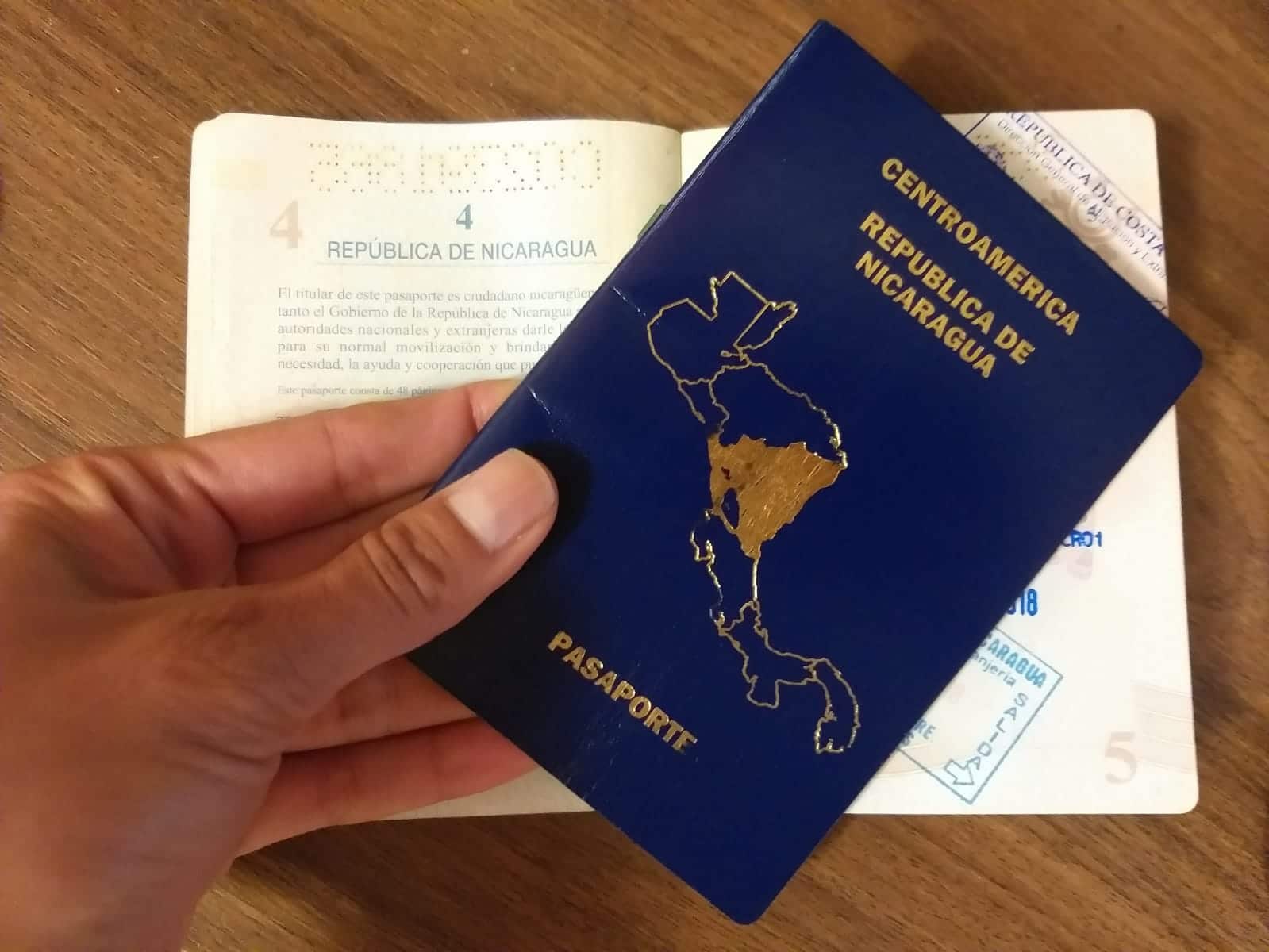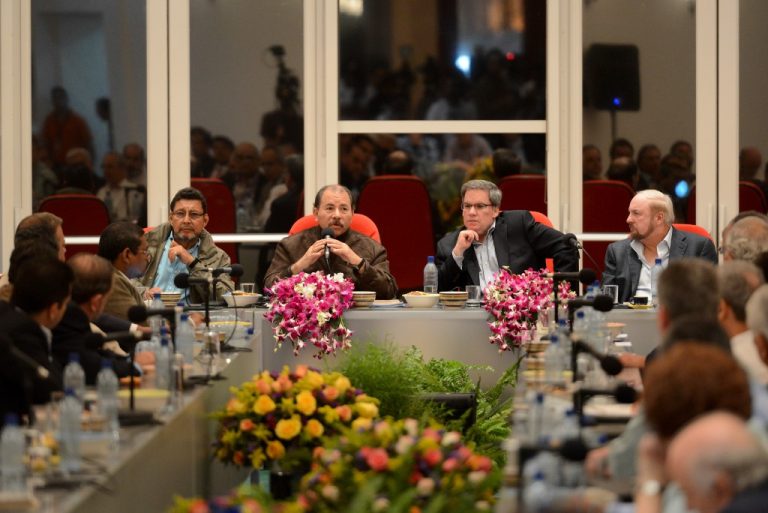4 de septiembre 2020

Nicaragua: Public Employees Hindered from Traveling to USA

PUBLICIDAD 1M
PUBLICIDAD 4D
PUBLICIDAD 5D
As long as the business leadership isn’t accountable for its coexistence with the dictatorship, we will have no future

You must know your friends
There is a dynamic in Nicaragua that perpetuates poverty and injustice. The dictatorship, security forces —Army and Police—, and the oligarchy. One cannot speak of overthrowing the dictatorship without first recognizing the codependent relationship between this triad. Daniel Ortega and Rosario Murillo, the Nicaraguan dictators, have as partners and allies, a group of cronies who allowed the establishment of their power in all sectors of the country.
In 2014, through the modification of 40 articles of the Political Constitution (the ninth amendment), the dictator obtained the green light for indefinite reelection. The mediation of the Defense and Interior Ministries with the armed forces ended. This established a direct relationship between the President and the Army and the Police (Arts. 95 and 97). In this way Ortega became the Supreme Commander of both institutions. Meanwhile, the public-private negotiation model that focused on economic issues became institutionalized.
This modification was brewing in previous years. Prominent businessmen expressed satisfaction and appreciation for the negotiation model focused on economic issues.
In September 2013, after the electoral fraud in the 2008 municipal elections and the unconstitutional reelection of Ortega in 2011, [wealthy businessman] Carlos Pellas expressed: “Do I believe that there is a democracy? Well, there are elections and elections determine who is the winner…the processes continue to be maintained; therefore, I believe that yes, we are living in an open country.” Regarding the economic negotiation model with Ortega, he added: “in Nicaragua we seek to work by consensus and not under an authoritarian process…here we have a process where most of the laws are negotiated and consensus is reached.”
In another meeting held at the beginning of 2014 between the leadership of the private sector and members of the dictatorship, Ramiro Ortiz, expressed: “…this permanent dialogue that we are having is truly a miracle for this country. We are grateful to the government for allowing us to have this interchange. I also congratulate the government for recognizing the coexistence between the government and the private sector.”
A recognition and disclosure of a model that according to Ortega “would make us the first country to institutionalize this model, giving it not the strength of the political will of whoever is ruling, but rather that by law established in the Constitution that this mechanism works, regardless of who is in the Government.” Ortega, a dictator who thinks he is a professional or business expert.
Coexistence is to cohabitate, to live together, learning to love each other in a designated space. In Nicaragua, the dictatorship and the leadership of the private sector have been living together for many years. The Army and the Police clean their houses and make their beds every day. They do so without wasting time participating and partnering in businesses with them.
This quasi-genetic code pushes us to cling to any quota of power and perpetuate ourselves in it. It is of utmost importance because it’s responsible for the unnecessary prominence with which many people act as soon as they become familiar with power. So, for example, the secretary who controls the information that reaches her boss; the person in charge of signing and sealing an ID card; or the COSEP business association president who’s been in office for thirteen years.
During the 1980s, characterized by scarcity and rationing, the COSEP presidents who operated under extremely difficult conditions were: Enrique Dreyfus (1979-1983), Enrique Bolanos (1983-1988) and Gilberto Cuadra (1998-1990). Subsequently, the presidents succeeded each other every one or two years. This until the arrival of Jose Adan Aguerri, a year after the election of Daniel Ortega in 2006.
Both continuously reelected, they modified the laws and regulations of their fields, to perpetuate themselves in power. Mr. Aguerri recently told the media that “the dynamic of private sector elections is different from the political arena.” He stressed “the importance of the unity of businessmen to prevent any incitement of division.”
Some would argue to maintain the dialogue model with the Government, even when democratic institutions are questioned. I think for Aguerri, democratic principles vary depending on who they’re applied to and which interests they promote. That amounts to believing that stealing is bad, depending on who steals.
Richard Feinberg, of the Brookings Institute, explains that, “the soft landing is a negotiated agreement to solve without further bloodbath, the crisis in Nicaragua.” This “soft landing” theory is the one promoted by bankers and the cream de la cream of the private sector. The group is comprised by the 14 COSEP advisers: Miguel Zavala, Carlos Pellas, Cesar A. Lacayo, Miguel Gomez, Jose A. Baltodano, Ramiro Ortiz, Juan B. Sacasa, Jaime Rosales, Alberto Chamorro, Jaime Montealegre, Roberto Zamora, Ernesto Fernandez, Jose I. Gonzalez and Rene Morales Carazo. Other business people that don’t act as advisers, played a key role in the under the table negotiations.
This model, this “soft landing,” has only been useful to give the dictator time to negotiate his departure. To ensure his impunity for crimes against humanity and seek protection for his ill-gotten wealth.
The crisis that began in April 2018 seemed to break the preexisting arrangement between the Dictatorship-Army/Police/and business leadership triad. However, what happened only proved to be a tremor in a highly seismic country, that they are used to. There was unrest which negotiators on both sides quickly spotted and sat down seeking for a way to maintain their coexistence. Hoping to re-stitch the fabric of the Ortega model and ensure its functioning.
Unfortunately, little can be done. Honesty and decency are two of the few things worth aspiring. This includes big companies, including those in the Free Trade Zones, paying the corresponding taxes. Then reinvesting the funds in the local economy. The Army should be abolished in order to assign these funds to social areas, such as education and health. Regarding the Police, it needs reorganizing its basic principles.
As long as the business leadership is not accountable for its coexistence with the dictatorship; as long as the almost inherent Nicaraguan behavior exists that allows us to be blind with our eyes open; as long as there are no political, judicial and legislative reforms that sustain economic growth and foster a true governance in the country; as long as there are privileged groups that seize power to accumulate greater wealth evading their fiscal responsibility; or while, as Bishop Silvio Baez said very well, if we continue “to measure in currency the future of the country,” we will have no future and those killed in the April rebellion and their hopes of relaunching a better country would have been in vain.
The triad of evil —dictatorship-Army/Police-oligarchy—, will continue to feed on the poverty and misery of Nicaraguans. Leaving more exiles, more separated families, more trauma of which we are all tired.
PUBLICIDAD 3M
PUBLICIDAD 3D